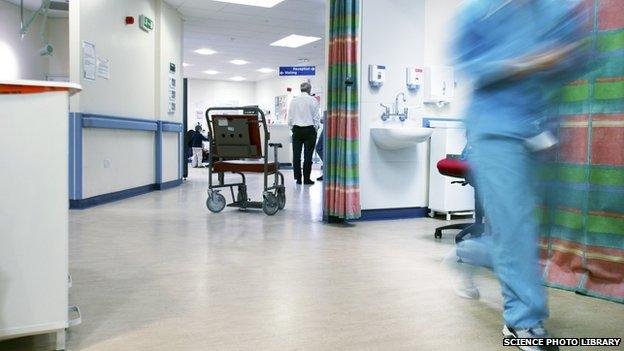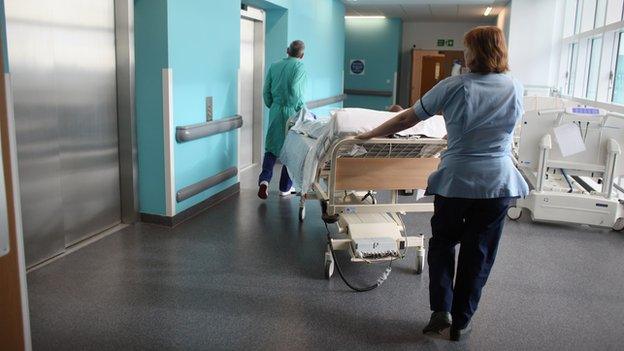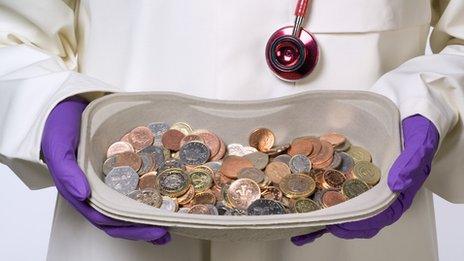NHS trusts' deficit rises to £822m
- Published

Foundation trusts spent £1.8bn on contract and agency staff - more than double the amount planned
NHS Trusts in England have reported a total deficit of £822m in 2014-15, compared with £115m the previous year.
A big rise in spending on agency nurses has contributed to the deficits.
Figures from health regulator Monitor show that Foundation Trusts, the leading health trusts in England, racked up a deficit of £349m, while other trusts were £473m in the red.
The Department of Health said trusts needed to get better at balancing the books.
The regulator said figures for this financial year were likely to be even worse.
Foundation trusts run some hospitals, ambulance and mental health services, but they are not controlled by central government.
They make up around two-thirds of all trusts in England.
A report carried out for the regulator found:
A £349m deficit compared with a planned deficit of £10m
Of the 152 foundation trusts, half ended the year in deficit - and 70% of them were acute trusts
Trusts spent £1.8bn on contract and agency staff, more than double the amount planned
The size of the waiting list for routine operations at foundation trusts was nearly 1.8 million, an 8.3% increase on 2013-14
Monitor assesses NHS Trusts before they can become NHS Foundation Trusts, making sure they are well led so they can deliver quality care.
'Challenging'
Dr David Bennett, the chief executive at Monitor, said: "The last financial year was exceptionally challenging for the Foundation Trust sector, and it is clear the current one is following the same pattern.
"The sector can no longer afford to operate on a business as usual basis, and we all need to redouble our efforts to deliver substantial efficiency gains in order to ensure patients get the services they need."
He added: "This will no doubt involve some significant changes to the way people work at some institutions, but as the regulator we believe there is scope for more to be done at a number of levels without compromising patient care."
He said it was right that, in difficult circumstances, agency staff were being used to ensure patients always received quality care.
However he said trusts needed to act to "reduce their over-reliance" on such staff.

Analysis
Hugh Pym, health editor
The big question now is what happens in the current financial year if, as some are predicting, the total deficit in those trusts soars towards £2bn.
The Department of Health's ability to raid the "rainy day" reserves can go only so far.
Going cap in hand to the Treasury may be the only option.
Ministers say that the Chancellor George Osborne ploughed £2bn more into the NHS for the current year and that hospitals and other providers should work within their budgets rather than demanding more money.
The debate will rumble on over the summer and no doubt become more vocal once winter sets in.

The report on foundation trusts' performance also says Monitor intervened at 32 trusts because of operational or financial concerns.
'Tight financial grip'
A spokesperson for the Department of Health said: "We know the NHS is busier than ever and trusts are facing challenges; however we expect them to show tight financial grip and live within their means."
It said the government had already invested £8bn in the future of the NHS.
Richard Murray, director of policy at The King's Fund think tank, said the fact the deficits had occurred despite extra money being provided by government was disappointing.
"Plugging the growing black hole in NHS finances must now be an urgent priority for the government.
"There is a real prospect of deficits snowballing and, unless the government finds extra money, an accelerating decline in NHS performance and a deterioration in patient care."
Chris Hopson, NHS Providers' chief executive, said the situation must be urgently reversed.
"Despite providers' best efforts, accident and emergency, referral to treatment, diagnostic wait and a range of other targets have also been missed, representing a rapid and widespread deterioration in NHS performance and finances."
- Published21 February 2015

- Published8 March 2014

- Published19 September 2014

- Published18 June 2014
